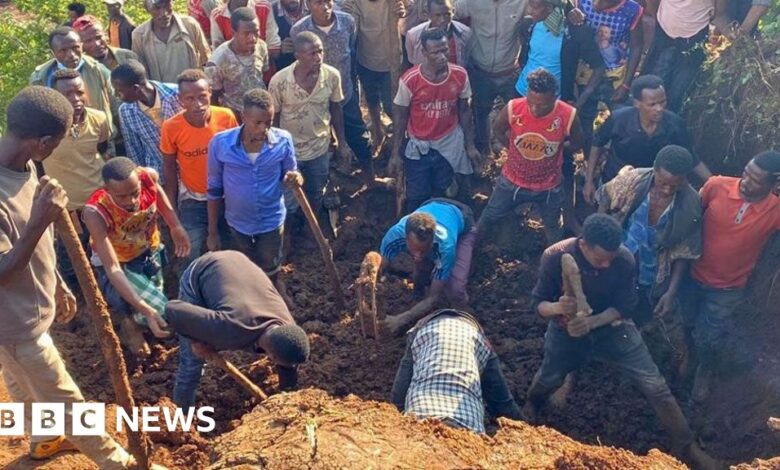Frantic dig for survivors in Gofa

At the scene of Ethiopia’s deadliest landslide, men are still digging through piles of mud with their bare hands and shovels to find the missing – their efforts punctuated by the wails of women and children mourning the 229 people whose bodies have been found so far.
They were victims of a cruel act of nature: on Sunday, heavy rains triggered a landslide in a village perched high on a mountain in the remote Gofa region.
With four houses submerged in the landslide, nearby villagers and police came in droves to dig through the mud in the hope of finding survivors, while women and children stood by, praying and comforting each other.
The search continued on Monday, but a second landslide struck, burying hundreds of people — no one knew exactly how many — under mud.
When I arrived in Gofa, southwestern Ethiopia, late Wednesday, about 100 to 200 people, mostly young men, were still digging while relatives sat nearby, hoping for the best.
The diggers had no bulldozers – they couldn’t be brought in because there was no road into the village.
There is only a narrow, muddy path along the cliff. It is a very dangerous and steep climb up to the village – and walking down is just as dangerous.
When the body was found, the family was forced to carry their loved one down this trail for a formal burial.
Men with somber faces built graves one on top of the other, while women and children in these farming communities wept incessantly.
Disaster relief officials say drones are being used in search and rescue operations.
One man I spoke to said he saw them on Tuesday, but he hasn’t seen them since.
For the villagers, there was only one option: to continue digging with shovels and bare hands in the hope of finding their loved ones – still alive.
Fortunately, the weather on Wednesday was quite nice, making the digging easier.
Gofa is part of the state known as Southern Ethiopia, located about 320km (199 mi) southwest of the capital Addis Ababa.
This is one of the areas of the country that has suffered particularly heavy rainfall and flooding in recent months.
But landslides and floods have been occurring for much longer.
In May 2016, At least 50 people were killed. in floods and landslides following heavy rains in the south of the country.
The UN humanitarian office (Ocha) said Ethiopia needed $3bn (£2.3bn) to help people affected by last year’s El Niño – which caused drought and flooding – as well as conflict, but the effort was “severely underfunded”.
“With the extremely heavy rains coming, we expect to see more emergencies like this,” Paul Handley, Ocha’s director in Ethiopia, told the BBC’s Newsday programme.
There are concerns about the stability of the slope in the landslide area and 10,000 people in the area need to be evacuated “out of harm’s way”, Mr Handley added.
Additional reporting by the BBC’s Basillioh Rukanga in Nairobi.




